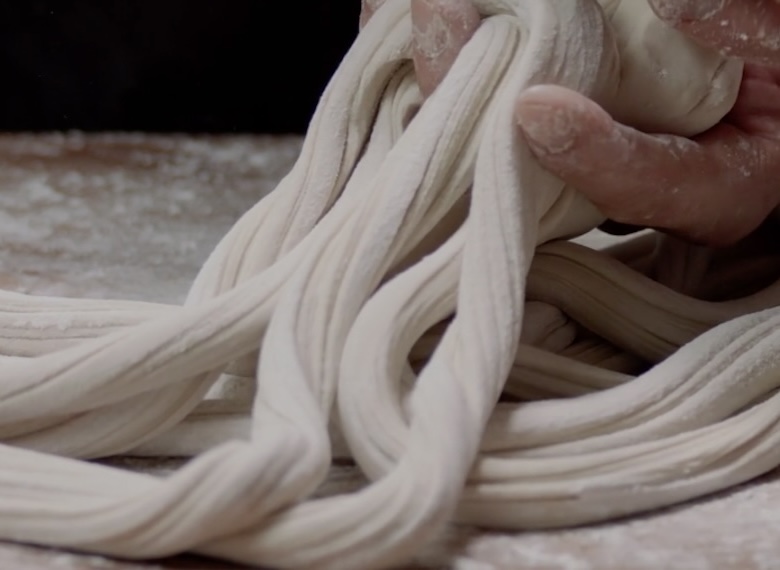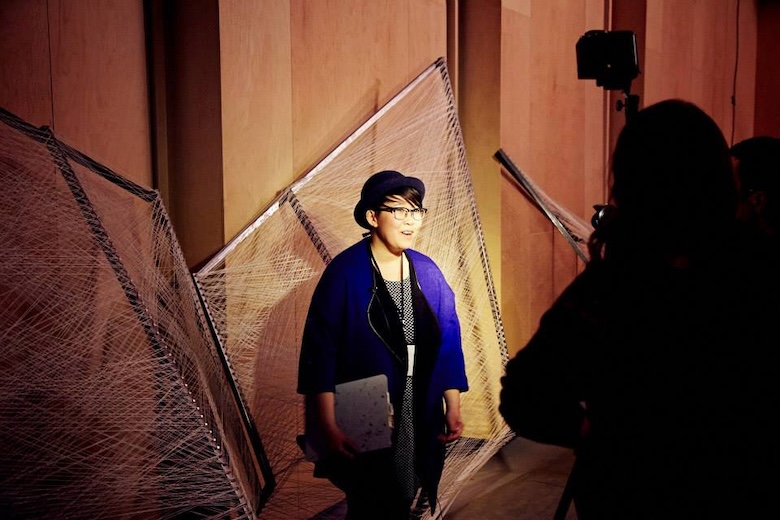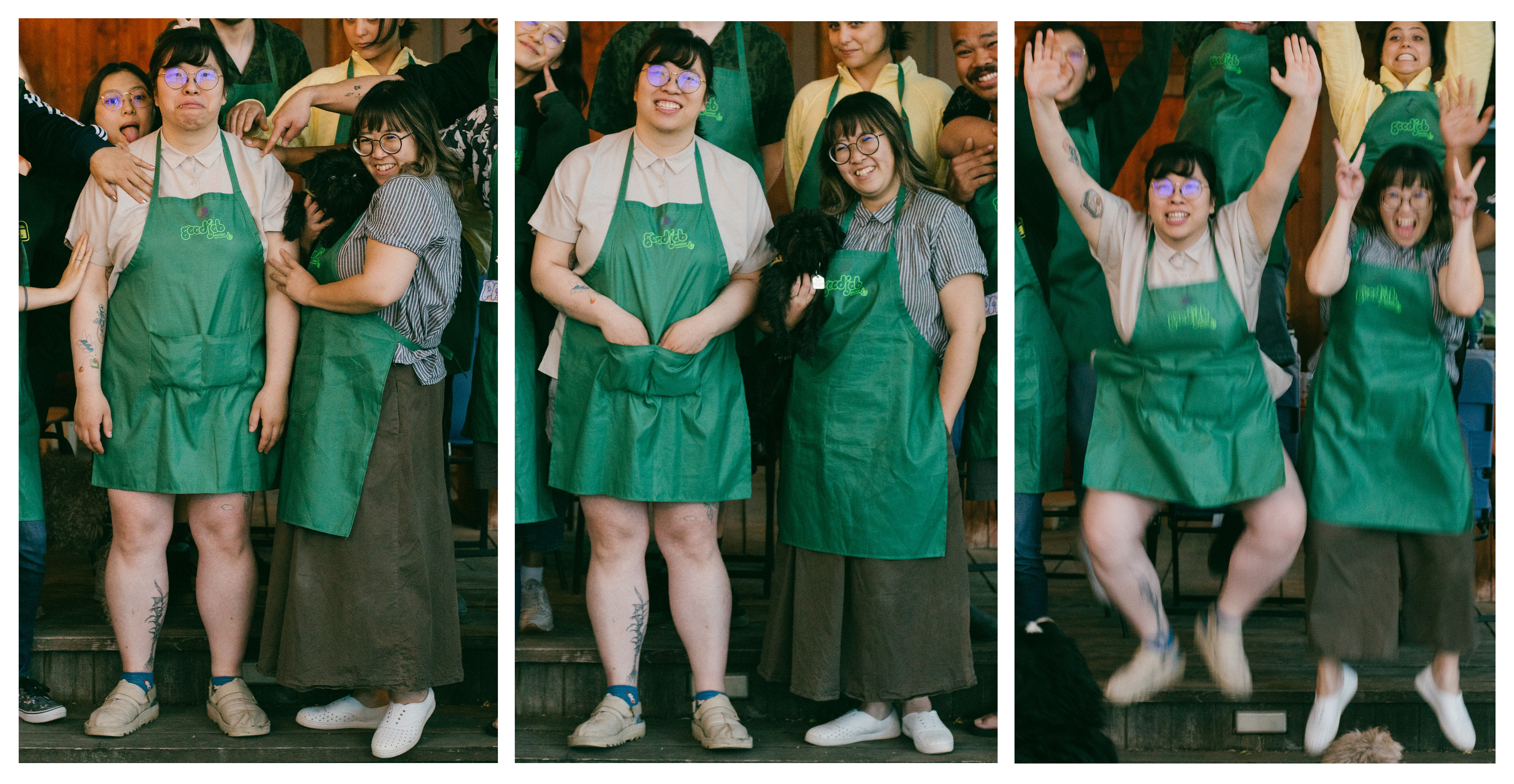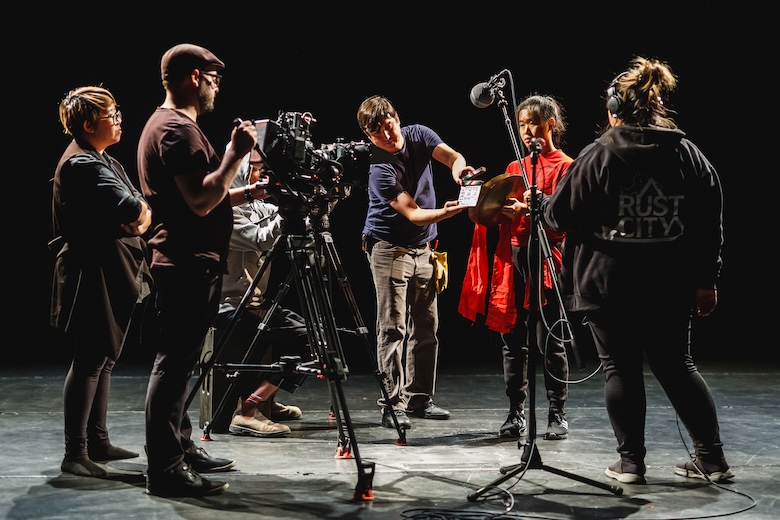For the final issue of Luma Quarterly, I was reflecting on the impact EMMEDIA had on me during the early days of my arts career as a second generation Chinese Canadian. My involvement with EMMEDIA began summer of 2011 through the Production Access Scholarship Program while I was a student at Alberta University of the Arts (AUArts). I was part of the organization for nine years as a member, exhibiting artist, and volunteer, including seven years on the Programming Committee and five years on the Luma Quarterly Editorial Committee. EMMEDIA was the place where I gained experience in presenting and understanding my work, learned what it means to be on committees, and formed a sense of appreciation and indebtedness to community.
In my reminiscing, someone vital to every significant moment I had at EMMEDIA involved Vicki Van Chau, who was at EMMEDIA from 2008 until 2020, first as the Communications Coordinator and then as Programming Director. She was instrumental in the creation and running of many programs, such as PARTICLE + WAVE Festival and Luma Quarterly, both of which I was part of through her guidance. What started as an arts administrator and student relationship, transformed to close friends and colleagues deep into our arts careers. When I sat down with Vicki, we reflected on how we got here and what the media arts community means to us as women of colour.
Teresa Tam (TT): We'll start with who you are and how you got here.
Vicki Van Chau (VVC): I'm a media artist and cultural worker here in Calgary, Alberta. I went to the Alberta College of Art and Design, now the AUArts, and went through their Media Arts and Digital Technologies program. Right after I graduated, I was a summer student at the EMMEDIA Gallery and Production Society and I fell in love with the community. The media arts community is so open to collaborating and very process-driven, which I enjoyed. I also worked with a lot of local senior media artists from Sandra Vida to artists from out of town, like Tasman Richardson, who inspired me to work on my practice.
In 2020, I ended up leaving EMMEDIA. Not because of the pandemic, I wanted to have more time to focus on my own practice. I got into Herland, a program for emerging female filmmakers. After that program, I enjoyed film as my medium of choice. Three to four years later, I'm still working in film. But I still have a love for arts administration. Now I’m back to working for non-profits and I'm the Executive Director of the Alberta Media Arts Alliance Society. Media arts have always been the community that I connected with, it’s just so inclusive, especially being someone who's a woman of colour. I find the media arts community welcomes that. There are a lot of opportunities for me to create and collaborate with a lot of really talented artists.
...Calgary is like, oh, what are you doing? Oh, that's amazing. How can I help you achieve what you're doing?
TT: You already touched a bit on how the community is collaborative and inclusive, are there any examples of people or processes that you found that exemplified that?
VVC: EMMEDIA had a huge impact on my practice, but so did Quickdraw, and the Calgary Society of Independent Filmmakers. The thing about these media arts centres is they help an artist from pre-production and production to presentation. I've seen so many artists go through and grow in these centres, including yourself, and are now doing amazing things beyond these communities, and creating their own spaces. You know how everyone says Calgary has this very entrepreneurial spirit. I think that's true not only in the corporate business world of Calgary but also in the arts world as well. Calgary is such a young city, and I find there are many more opportunities for artists to create their own space and create something that isn't here.
So, I find Calgary specifically is great for that because I find the bigger cities I've visited, the art communities of Vancouver, Toronto and Montreal, because there's such a large pool of artists, they're all competing for the same resources that it becomes quite competitive and less collaborative. Whereas Calgary is like, oh, what are you doing? Oh, that's amazing. How can I help you achieve what you're doing? And how can we work together so that we both get supported and survive together, we know how hard it is to be an artist in such a conservative province.
TT: How important is it for you to be able to build your community? Can you share how you formed your own and what community means to you?
VVC: I was so fortunate to be part of EMMEDIA because that was my community. And it wasn't until I left EMMEDIA that I started expanding and that's when I started to be like, oh, actually, the community is so much bigger than I could imagine. When I find someone that I work great with, I stick with and invest in them. For the first project, I might not be able to pay them as much, but as I get more and more funding, I can pay more for this next project, and they become invested in your projects and believe in you as a director. It’s important to not only start these relationships but to continue building them, continue investing in them. If everyone's going to be supporting each other, they’re going to become better cinematographers, grip or gaffers or whatever position they take. And then you're going to become a better director or producer because of that. I think that's really important to keep building new relationships, but also strengthen the ones that you have.
TT: Being involved in EMMEDIA helped foster my sense of how I want to approach my work as an artist. At the time, there were opportunities you encouraged me to apply for. I was like, okay! I don't know what I'm doing, but that sounds cool. It was nice to feel like I was being pushed to do stuff, even if it didn’t make sense to me at the moment. I felt that encouragement. Did you have someone like that when you were going through your journey to where you are now?
VVC: At EMMEDIA the other staff members who are more senior there, definitely pushed me to become who I was, like Peter Morgan, the Operations Director when I was at EMMEDIA. The previous programmers like Kari McQueen and Tomas Jonsson, everyone who went through that building and my co-workers were huge mentors to me. Even if they were younger or older than me, I consider them all mentors because they all had their own experiences that I could learn from. Going back to when you started at EMMEDIA when you first came to the centre, you were probably one of the first Asian artists other than myself who I related to. And I think that's why we got close because I was like, oh, there's another Asian artist, I could see myself in you. It was great that you came to EMMEDIA while you were in school.
I didn't know about EMMEDIA until after I graduated. I think I would have excelled even more if I had been part of the community outside of school. So, it was great to see you coming in and already becoming part of the artist-run culture. I've told you this before where I was like, okay, this is a person that I want to eventually foster and then basically take over this place. I didn't end up leaving until 2020 and then you took this other path and did your own thing.
TT: I find that older artists, especially BIPOC artists, don't tend to stay around. We're both getting to the point of our careers where we're becoming older and no longer emerging artists. We’re entering a stage where we're going to be seen as mentors for people. I've been thinking a lot about what it means for me to be a mentor or to continue to work here as an artist. How do you maintain a career long-term until you become someone like Sandra Vida, Rita McKeough?
VVC: Sandi Somers and Michelle Wong who are creating their own spaces.
TT: Do you find that you're starting to feel a bit disconnected with the newer generation of artists?
VVC: It's funny because I'm kind of in two different worlds. I feel, yes, I am a senior when it comes to arts administration but in terms of my own practice, I didn't really start my own practice until I left EMMEDIA. So, when I go into the film industry, I consider myself quite emerging, but I can be a mentor if there are emerging arts administrators who need help. I feel like I have enough expertise and knowledge to come in and help them with that.
VVC: It's hard to step into these arts administrative roles and right now, I find there's this huge push for BIPOC arts administrators to take on these roles, and they're not prepared for it. I was lucky that I was able to start as a summer student and build my way up to become what I am now. But people are coming straight from college and into these director roles and they are just drowning. They didn't have those years to learn. I was lucky to have Peter Morgan to guide me. A lot of them don't have someone like that. I’m a little worried, but people persevere. These centres persevere. When I took on the director role, I still had no idea what I was doing. Sometimes I still don't think I really know what I'm doing. I'm just kind of stumbling my way through.
TT: For you, what are some challenges you've had over the years, especially as someone who's an Asian woman? What are some things you wish you had known about sooner?
VVC: Media arts was still quite male, and white male, dominated when I first started EMMEDIA. It wasn't until I started my art practice that I started to become more in tune with my own identity. The previous generation of artists, they were discouraged from creating work that was about their identity. There's a lot of assimilation that was involved, especially in the older generation. I'm working on co-producing a documentary about a Japanese artist who's now based in Ottawa. He did not want to make any work that was related to his Japanese ancestry. He wanted to work as far away from that as possible because of his relationship with the war and the internment camps. He was not proud to be Japanese and it wasn't until later in his career that he started to identify with and became comfortable in talking about his Japanese identity in his work. That was similar to me, it wasn't until I started making my films that I started to really explore my Chinese and Vietnamese identity and make works about that.
But now I'm at a point where it's like, is that the only work I'm allowed to do now? Now everyone wants that type of work. Am I pigeonholed now? People are not interested in the work unless it's about my trauma or about my identity in some way. I was talking to another BIPOC artist, he was saying that he couldn't get programmed in galleries because they're like, “Your work has nothing to do with your identity. But my identity is intertwined with the work. The work is me. It just doesn't boldly be, oh yes, I'm a person of colour.” So, we're getting to this place where the type of stories they expect us to tell doesn't seem as representative as others would like them to be. I find that a challenge a lot of BIPOC artists have to navigate. I still really love making work about my identity, but I don't want to be forced into that. There's this burden to be the one person that represents your entire community. I find that a struggle, especially in Calgary because our community is so small. I'm sure you feel it, too, you're called on whenever there's some sort of Chinese community-based art initiative.
TT: Not only Chinese, just “Asian” in general.
VVC: Right? I was talking to Jae Sterling. I was like, how does it feel like to be the black artist that represents the entire black artist community in Calgary? And he's like, it sucks. It's great that people are coming to us, consulting with us and making sure that things are good. But sometimes it's like…
TT: We feel like we’re stuck in this expectation of representing what people think we’re supposed to be representing.
VVC: It’s hard for me because I feel like I owe it to my community to make sure that it's correct. Like, oh my God, I do not want to screw it up. I don’t want it to be “Hey, look at, Vicki. She doesn't even know what she's talking about and she's trying to represent the Chinese community”. It's a daunting task that you get put in.
TT: It’s a bit unfair to feel like you’re not representing the community when you are. It’s just that you can't ever represent a whole community as one person. That’s something that I think people forget sometimes, especially when there’s this pressure that you have to represent better because you have a platform, you have this chance to share your voice. We want to start telling other stories and it’s not that what's been told so far isn't important. We're just trying to not feed into the caricatures of ourselves. What's nice though is that we can give each other the space to not always do that.
I still really love making work about my identity, but I don't want to be forced into that.
VVC: Now as a filmmaker, I find my stories, even though they're meant for people like me, the festivals that I show at, the ones that my films are successful at, are still very white spaces. The spaces that I want to get into, like the more Asian film festivals, the ones that are for the community, by the community, they don't like my work.
TT: Do you know why?
VVC: When I see the type of work that they're programming, a lot of the stories are about trauma, like generational trauma or dealing with racism. Whereas my work is very celebratory of a very specific type of culture. It's a very Canadian, second-generation perspective. To me, I'm just getting reintroduced to my own identity. And then when I'm trying to show at Asian film festivals here in North America, I feel like my work just doesn't…
TT: Doesn't hit that trauma threshold?
VVC: Yeah, maybe I don't know.
TT: Seems like everyone only wants to hear your trauma, which is kind of messed up when you think about it.
VVC: It reminds me of a statement I made to a magazine where they used a pull quote out of context. What I basically said was, “Me being a person of colour and a woman in the film industry is already a political statement, I don't need to be political, I am just inherently political.” And taken out of context, that makes me seem so ungrateful like I don't care about the work that I do. Which is not true because much of my work revolves around that. I'm already going through all these obstacles just to create art. So, for you to say that what I make is not political enough for you? But I feel like it's changing. A lot of the representation that we see in media and art is changing. The type of work that the new generation of artists are creating is changing. It'll be interesting to see how we can get over our challenges to be able to support the younger generation in their challenges, whatever they may be.
TT: What's something you want to impart to the newer generation of BIPOC artists and administrators? What's something that you would like to see if you were reading this article, something that you would find comforting, encouraging or a kick in the butt?
VVC: I feel like people are constantly afraid to say the wrong thing or to make the wrong decision. People are almost petrified in making decisions. For emerging artist administrators, I want to say, you got the job, you're in a position of power, and you take advantage of that. Don't be afraid to take charge and make decisions and just go for it. You were hired because they trusted you to decide how these galleries or organizations are going to be run. So don't be, “Oh, this is what the past person used to do. Or like this is how it was always done. So I should do that”. No, they hired you because you're the new, fresh perspective. They want you to do things differently or even better than what was done before. So don't be afraid to shake things up. But also know your limitations as well. Don't do it where it's out of your capacity and then you burn yourself out. Know your boundaries and set them. Don't be afraid to make changes because things are changing.
TT: How about for people of your generation? What would you like to tell them? Those who are still in the field as artists and administrators, and those who have taken a break or are no longer as involved.
VVC: You're never too old to try something new, meet new people, and have new collaborators. And just keep making work. It's hard. Being at this for a long time, it's not easy, but just take it one step at a time, really. Sometimes you'll need to take a break, and then sometimes you'll get back into it or start something new.
TT: So, what's next for you? What are things that you have coming up and what are your long-term goals?
VVC: I'm sort of in this weird transition. I just started my work with AMAAS and going back to this community that I left during the pandemic. I still have a few projects left to finish. I’m moving to a producing role where I help other people realize their projects. Working in an arts administrator and film producer role, I can be part of both worlds. Through my work for AMAAS and in film, I’m able to create more opportunities for people to be able to succeed. And yeah, just continuing to invest in artists that I really believe in and artists whose work I really love. I want to continue supporting and helping them in any way I can. And just keep doing that for the foreseeable future.
TT: What's your email address for people to reach you?
VVC: Well, you can reach me at admin@amaas.ca any time.






